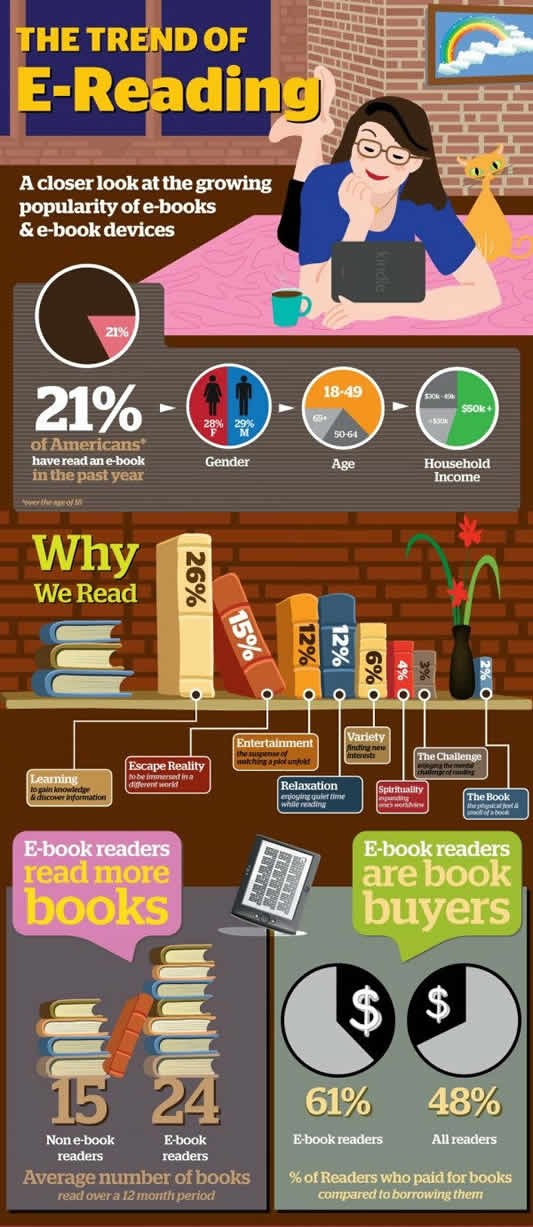An infographic released by Infographic Labs cites a Pew study finding that those who read paper books average 15 books each year, while e-book readers read about 24. If you own an eReader of any kind, how has it affected your reading habits?
Writing is Hard Work
If you want to be a great writer and you have the choice between being brilliant and lazy or being a little clueless but motivated, choose the latter. You stand a far better chance. Sure, such intangibles as creativity, talent and inspiration play a role, but work is where the real action is.
Alexander Steele
If you had followed me around the last few months you would know how true the preceding quote is. But all the hard work is beginning to pay off. Part of that work and yet pleasure has been revisiting past novels such as The Cure. Here is a short excerpt from the afterword that will appear in its coming re-release.
———————————-
When Saint Paul tells us he was given a thorn in his flesh he doesn’t tell us what it is. He omits that information intentionally, so we can all relate to his circumstances. Paul asks God three times to remove his thorn, but God explains that Paul is better off with it in place. The thorn—whatever it may be—is a constant reminder that Paul is powerless without God. It reminds him to stay humble, to admit his own willpower isn’t strong enough to overcome his affliction, and to focus instead on help from a Power greater than himself. So as much as it hurts, Paul accepts his thorn. In fact, he boasts about it. It is this very event that leads him to write those famous words: “When I am weak, then I am strong.”
I was thinking about Paul’s thorn when the idea for The Cure came to me. I asked myself, “If someone had offered an instant cure for Paul’s problem, would he have taken it in spite of what God said? And if he did, what would have happened next?”
I decided such a “cure” would have made life even more miserable for Paul. I decided I would rather live with the humiliating weakness of my own addiction to immorality, than suffer from the lonely delusion that I had no need for God. I decided to write about a man who came to that same conclusion.
Athol Dickson, Laguna Niguel, California, May 3, 2012.
Well Isn’t That Special
 IRONY SOMETIMES CRACKS ME UP. I belong to several email lists (loops, whatever) and on one of them recently I wrote a comment about Christians who claim to read fiction, but who actually seem to enjoy it mainly for the chance it offers to be offended. Most novelists working in the world of Christian fiction have received outraged letters from these people. In my email comment I referred to them as “dreaded blue haired church ladies.” Of the 1,000 or so other people on the list, most understood exactly what I meant (probably they were Dana Carvey fans), but a tiny and very vocal group took me to task for using that phrase. They responded to the entire loop, saying one should not reinforce negative stereotypes; one should be more sensitive to other people’s feelings. Oh, you would have thought I’d called Jesse Jackson and Al Sharpton the “N” word!
IRONY SOMETIMES CRACKS ME UP. I belong to several email lists (loops, whatever) and on one of them recently I wrote a comment about Christians who claim to read fiction, but who actually seem to enjoy it mainly for the chance it offers to be offended. Most novelists working in the world of Christian fiction have received outraged letters from these people. In my email comment I referred to them as “dreaded blue haired church ladies.” Of the 1,000 or so other people on the list, most understood exactly what I meant (probably they were Dana Carvey fans), but a tiny and very vocal group took me to task for using that phrase. They responded to the entire loop, saying one should not reinforce negative stereotypes; one should be more sensitive to other people’s feelings. Oh, you would have thought I’d called Jesse Jackson and Al Sharpton the “N” word!
One of the funny things about irony is the way it’s usually lost on those who need it most. How I laughed when I realized these people had been so easily offended by words I used to describe people who are easily offended! But then I started getting private emails. People I had never heard of wrote to say they had stopped speaking their minds on the list out of fear that they too would be slapped down. Soon I realized there was a deeper problem than simply a few folks who wear their feelings on their sleeves. The situation wasn’t funny anymore. To understand why, I think we have to start with this:
The Bible is not a rulebook for life; it’s a book of higher principles, which are illustrated by examples we too often mistake for rules.
Consider the Internet and especially email, for example. They can be wonderful things. I don’t know how I got along without them before. (Just think of how much money it would take to buy a stamp for every note you email today!) What a blessing to be able to fire off notes so quickly…and what a curse. Sometimes emails can be as difficult to control as our tongues.
Take a moment to read what the Bible has to say about this problem, and notice that it offers no rules about emails. Instead it gives a principle which applies perfectly to a technology the author never dreamed possible.
This can cut both ways. I believed my words were innocent, of course. I believed the offended people were just oversensitive. But what if they were right? Should I have been more sensitive with my words, in case they reached some actual old lady with blue hair and very strong church affiliations, who might have had her feelings hurt because she thought I was referring to her? Well, maybe. Humility is not thinking less about yourself; it’s thinking more of others. So maybe I wasn’t thinking enough about the real “blue haired church ladies” out there.
If so, it leads to another principle that applies.
“If your brother sins against you, go and show him his fault, just between the two of you. If he listens to you, you have won your brother over. But if he will not listen, take one or two others along, so that ‘every matter may be established by the testimony of two or three witnesses.’ If he refuses to listen to them, tell it to the church; and if he refuses to listen even to the church, treat him as you would a pagan or a tax collector.” (Matthew 18:15-17) NIV
If we are offended by someone’s words in an email, taking them to task for it and copying an entire list of others is like stepping up behind the podium in a church sanctuary and accusing someone by name of a sin before the entire congregation. How strange that people who would never dream of doing that except as an absolute last resort can be so quick to do it via email. What a shame we don’t apply Jesus’ principle instead.
Similarly, in any public exchange of ideas such as an email list (or a blog comment), we Christians ought to guard our words as closely as we ought to guard our tongues. While the Bible says a lot about controlling speech and nothing about how to write an email, the principle applies equally to both. “In your anger, do not sin” as Paul commanded the Ephesians. He might just as well have written, “In your offense, do not email.”
The tongue has the power of life and death, and those who love it will eat its fruit. (Proverbs 18:21) NIV
They Shall See God
I just finished a major rewrite of a novel that was first published over a decade ago, using everything I’ve learned to go back and relive that part of life …
